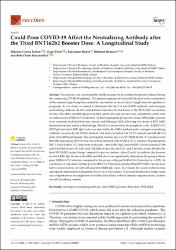Could Prior COVID-19 Affect the Neutralizing Antibody after the Third BNT162b2 Booster Dose: A Longitudinal Study
Citation
Erdem, M. G., Unlu, O., Buber, S., Demirci, M., & Kocazeybek, B. S. (2023). Could Prior COVID-19 Affect the Neutralizing Antibody after the Third BNT162b2 Booster Dose: A Longitudinal Study. Vaccines, 11(3), 560. https://doi.org/10.3390/vaccines11030560Abstract
Aşılama, devam eden COVID-19 salgını sırasında hastalığın yayılmasını önlemek için temel bir halk sağlığı önlemidir. Konakçının geliştirdiği immün yanıt veya aşının oluşturduğu immünolojik yanıtın devam etmesi, salgının gidişatını değiştirebileceği için hayati önem taşıyor. Çalışmamızda sağlıklı erişkinlerde BNT162b2 aşısının üçüncü dozu (15., 60. ve 90. günlerde) öncesi ve sonrasında oluşan anti-S-RBD antikoru ve taşıyıcı nötralize edici antikor (snAb) titrelerini belirlemeyi amaçladık. önceden SARS-CoV-2 enfeksiyonu olsun veya olmasın herhangi bir ek hastalık yoktu. Bu uzunlamasına prospektif çalışmaya, Ocak ve Şubat 2022 arasında, iki doz BNT162b2 aşılamasının ardından ve üçüncü dozdan önce 300 sağlıklı kişi rastgele dahil edildi. Periferik damarlardan kan alındı. SARS-CoV-2 NCP IgG ve anti-S-RBD IgG seviyeleri CMIA yöntemiyle tespit edildi ve bir vekil nötrleştirici antikor ELISA yöntemiyle görüldü. Çalışmamıza 154 (%51,3) kadın, 146 (%48,7) erkek (toplam 300) katılımcı dahil edildi. Katılımcıların ortanca yaşı 32,5 (IQR:24-38) idi. 208 kişinin (%69,3) hiç SARS-CoV-2 ile enfekte olmadığı, 92 katılımcının (%30,7) ise geçmişte SARS-CoV-2 enfeksiyonu geçirdiği keşfedildi. Anti-S-RBD IgG ve nAb IH% seviyeleri, üçüncü BNT162b2 aşı dozajından sonra 15. günde 5,94 ve 1,26 kat, 60. günde 3,63 ve 1,22 kat ve 90. günde 2,33 ve 1,26 kat arttı. aşılama öncesi değerler (0. Gün). Ek olarak, 60. ve 90. günlerde anti-S-RBD IgG seviyelerindeki azalma, önceden SARS-CoV-2 enfeksiyonu olmayan grupta, geçmişte SARS-CoV-2 enfeksiyonu olan gruba göre anlamlı derecede farklıydı (p < 0,05) . Sonuç olarak önceki SARS-CoV-2 enfeksiyonunun ve üçüncü BNT162b2 aşı dozunun hem nAb hem de anti-S-RBD IgG seviyelerinde daha düşük bir düşüşe yol açtığı gözlemlendi. Ancak aşının etkinliğini değerlendirmek ve aşılama programlarını güncellemek için, hala dolaşımda olan varyantlar mevcut olduğundan, bağışıklık tepkisi sorunu olmayan sağlıklı bireyler üzerinde çok merkezli, uzun vadeli ve kapsamlı araştırmaların yapılması gerekmektedir. Vaccination is an essential public health measure for preventing the spread of illness during this continuing COVID-19 epidemic. The immune response developed by the host or the continuation of the immunological response caused by vaccination is crucial since it might alter the epidemic's prognosis. In our study, we aimed to determine the titers of anti-S-RBD antibody and surrogate neutralizing antibody (snAb) formed before and after the third dose of the BNT162b2 vaccination (on the 15th, 60th, and 90th days) in healthy adults who did not have any comorbidity either with or without prior SARS-CoV-2 infection. In this longitudinal prospective study, 300 healthy persons were randomly included between January and February 2022, following two doses of BNT162b2 immunization and before a third dosage. Blood was drawn from the peripheral veins. SARS-CoV-2 NCP IgG and anti-S-RBD IgG levels were detected by the CMIA method, and a surrogate neutralizing antibody was seen by the ELISA method. Our study included 154 (51.3%) female and 146 (48.7%) male (total 300) participants. The participants' median age was 32.5 (IQR:24-38). It was discovered that 208 individuals (69.3%) had never been infected with SARS-CoV-2, whereas 92 participants (30.7%) had SARS-CoV-2 infections in the past. Anti-S-RBD IgG and nAb IH% levels increased 5.94- and 1.26-fold on day 15, 3.63- and 1.22-fold on day 60, and 2.33- and 1.26-fold on day 90 after the third BNT162b2 vaccine dosage compared to pre-vaccination values (Day 0). In addition, the decrease in anti-S-RBD IgG levels on the 60th and 90th days was significantly different in the group without prior SARS-CoV-2 infection compared to the group with past SARS-CoV-2 infection (p < 0.05). In conclusion, it was observed that prior SARS-CoV-2 infection and the third BNT162b2 vaccine dose led to a lower decrease in both nAb and anti-S-RBD IgG levels. To evaluate the vaccine's effectiveness and update immunization programs, however, it is necessary to perform multicenter, longer-term, and comprehensive investigations on healthy individuals without immune response issues, as there are still circulating variants.

















